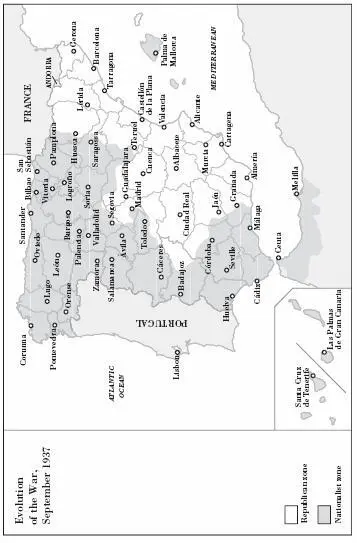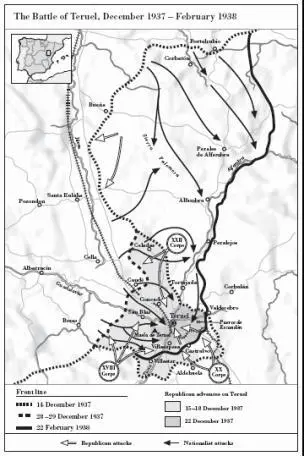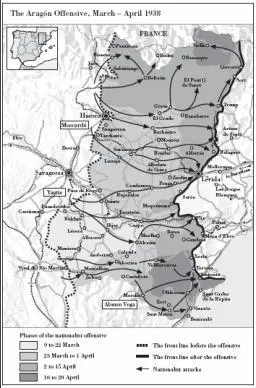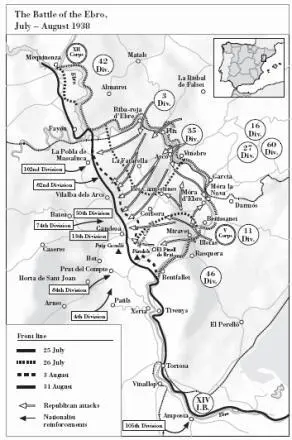Anthony Beevor
The Battle for Spain: The Spanish Civil War 1936-1939
For Gonzalo Pontón with all my gratitude for all his help












This book has had a curious life. I began work on what can now be called the prototype version in 1976, not long after the death of General Franco. It was finally published in 1982 under the title The Spanish Civil War , soon after Colonel Tejero held the Cortes hostage at gunpoint in an attempt to overthrow the democracy which had emerged under King Juan Carlos. Then, four years ago, my Spanish publisher, Gonzalo Pontón, persuaded me to rewrite the book completely. The idea was to use all the research carried out so painstakingly by Spanish and other historians over the last quarter of a century, as well as add new material from German archives and especially from Soviet files which had not been accessible.
Gonzalo Pontón, the founder of Crítica, the publishing house which has brought out more books on recent Spanish history than any other, made the project possible by sifting the huge number of books and academic papers on the subject which have appeared in recent years. Quite literally this book, The Battle for Spain , would never have been possible without all his help and enthusiasm in completing a project which proved far more extensive than any of us had foreseen when he first raised the idea. It has been an immense pleasure and a privilege to work with him.
For all non-Spanish editions I have included the original, perhaps over-mechanistic, synopsis of the country’s history as a very brief reminder for readers. The structure of the book also remains more or less the same as the prototype edition. The real difference lies in the detail and the sources, but interestingly, I find that the huge increase in information available today has tended to swell the number of vital questions rather than reduce them. This, on the other hand, may also be due to the author losing some of the more passionate certainties of youth over the last 24 years.
In any case, this book could never have been completed without a great deal of help from other friends and colleagues. In Russia, I am deeply grateful once again to Professor Anatoly Chernobayev for his advice and above all to my long-standing research assistant, Dr Luba Vinogradova, to whom I owe so much already. As well as the staff of numerous archives, I am particularly indebted to those in the library of ‘Memorial’ in Moscow. Angelica von Hase once again assisted me greatly in Germany, especially in the Bundesarchiv-Militärarchiv in Freiburg. In Sweden, Björn Andersson and Dr Lars Erickson obtained documents for me from the Swedish Krigsarkivet and Alan Crozier most kindly translated them for me.
In London, I have been extremely lucky to work once again with Ion Trewin, and as always, I am more than happy to have another old friend, Andrew Nurnberg, as my agent. All this turns publishing a book from a fraught and stressful experience into a co-operative and delightful one. And once again, my greatest debt of all is, as always, to my wife, Artemis Cooper, who has had to relive these years.
‘A civil war is not a war but a sickness,’ wrote Antoine de Saint-Exupéry. ‘The enemy is within. One fights almost against oneself.’ Yet Spain’s tragedy in 1936 was even greater. It had become enmeshed in the international civil war, which started in earnest with the bolshevik revolution.
The horrors in Russia had undermined the democratic centre throughout continental Europe. This was because the process of polarization between ‘reds’ and ‘whites’ allowed both political extremes to increase their own power by manipulating fearful, if not apocalyptic, images of their enemies. Their Manichaean propaganda fed off each other. Both Stalin and Goebbels later exploited, with diabolical ingenuity, that potent combination of fear and hatred. The process stripped their ‘traitor’ opponents of their humanity as well as their citizenship. This is why it is wrong to describe the Spanish Civil War as ‘fratricidal’. The divisiveness of the new ideologies could turn brothers into faceless strangers and trade unionists or shop owners into class enemies. Normal human instincts were overridden. In the tense spring of 1936, on his way to Madrid University, Julián Marías, a disciple of the philosopher José Ortega y Gasset, never forgot the hatred in the expression of a tram-driver at a stop as he watched a beautiful and well-dressed young woman step down onto the pavement. ‘We’ve really had it,’ Marías said to himself. ‘When Marx has more effect than hormones, there is nothing to be done.’ 1
The Spanish Civil War has so often been portrayed as a clash between left and right, but this is a misleading simplification. Two other axes of conflict emerged: state centralism against regional independence and authoritarianism against the freedom of the individual. The nationalist forces of the right were much more coherent because, with only minor exceptions, they combined three cohesive extremes. They were right wing, centralist and authoritarian at the same time. The Republic, on the other hand, represented a cauldron of incompatibilities and mutual suspicions, with centralists and authoritarians, especially the communists, opposed by regionalists and libertarians.
Ghosts of those propaganda battles of seventy years ago still haunt us. Yet the Spanish Civil War remains one of the few modern conflicts whose history had been written more effectively by the losers than by the winners. This is not surprising when one remembers the international sense of foreboding after the Republic’s defeat in the spring of 1939. Anger then increased after 1945, when the crimes of Nazi Germany came to light and General Franco’s obsessive vindictiveness towards the defeated republicans showed no sign of diminishing.
It is difficult for younger generations to imagine what life was really like in that age of totalitarian conflict. Collectivist ideals, whether those of armies, political youth movements or of trade unions, have virtually all disintegrated. The passions and hatreds of such an era are a world away from the safe, civilian environment of health and safety, and citizen’s rights in which we live today. That past is indeed ‘another country’. Spain itself has changed completely in a matter of decades. Its emergence from the civil war and Francoist era has been one of the most astonishing and impressive transformations in the whole of Europe. This, perhaps, is why it is unwise to try to judge the terrible conflict of seventy years ago with the liberal values and attitudes that we accept today as normal. It is vital to make a leap of the imagination, to try to understand the beliefs and attitudes of the time–whether the nationalistic, Catholic myths and the fear of bolshevism on the right, or the left’s conviction that revolution and the coercive redistribution of wealth could produce universal happiness.
Читать дальше
























